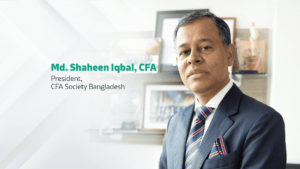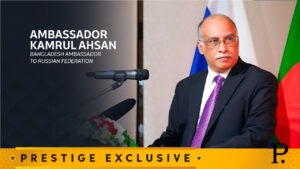Q. Give us a glimpse of yourself, educational background and your hobbies.
Ans- I have had my education mostly in Bangladesh. I was a student of Economics at Dhaka University and also have had a degree in International Law and Diplomacy Institute International d’Administration Publique in Paris. I came first in BA honors exam in the Dhaka University and subsequently had a Master’s degree in Economics from the Dhaka University in the same subject. After the competitive exam, we had to go through the training program for the civil servants at the Civil Service Academy, while I had the opportunity to go to Paris on training. Apart from the course on International Law and Diplomacy, I also had to learn French well. This was because the entire course was in French. It was a very challenging course indeed in which I stood first among all the international participants. I had my academic background in one core subject which was economics and of course it was supplemented by my training in international law and diplomacy which helped me a lot later on.
Q. You have had a very distinguished career and also represented BD in the regional and organizations alike. Can you share your experience and role while serving the country on multilateral issues in multilateral fora?
Ans- Well, when we joined the Foreign Service, we were expected to do many things which were a combination of multilateral and bilateral issues and subjects. Most of our diplomats have such rich experience of working on a whole range of varied issues. From the beginning of my career, I had a lot of subjects which were mostly multilateral in nature. When I was back home from assignments in Geneva and New York during the initial years of my career, I had a major role to play in preparing and articulating the position of Bangladesh in SAARC. I was put in charge of the substantive preparation of the Seventh SAARC Summit in I992. The Summit was actually held in 1993 after being postponed twice. I made a wholesome contribution to the drafting of the final outcome of the summit. Then later in 2003 again, the final outcome of the 13th SAARC summit which was held in Bangladesh was drafted by me. I was also Director in the Foreign Secretary office, while I was in Dhaka from 1992 to 1995, from the position I had an oversight role of the work of all the directorate and divisions of the ministry which was a major challenge. While at the SAARC Secretariat in Kathmandu between 1995 and 1999 I was again the chef de cabinet of the Secretary General and the head of the poverty eradication division. I had quite a diverse number of responsibilities at the SAARC secretariat and extensively worked for some of the most eventful SAARC summits held at the time. Three SAARC summits in succession to cite the exact number, I also represented SAARC at many functional levels at technical and ministerial meetings of the member countries. Afterwards, I went to New Delhi, where I was posted in the Bangladesh High Commission briefly serving as the Deputy High Commissioner. After my stay in Delhi I came back again to Bangladesh as Director General. Here, I was looking after the UN and International Divisions and had additional responsibilities looking after the Europe division and South Asia division for some time. It was a privilege to work for so many important wings in the Ministry but it needed great efforts to do justice to the trust reposed in me. My first ambassadorial assignment was in the Netherlands. I was there for 2 years and was sent to New Delhi as high Commissioner from there. I was only 53 years old, when I was appointed as High Commissioner of Bangladesh to India. Eventually. I retired from the service in 2009.

Q. Take us back on the tour when you were assigned to Bangladesh permanent Mission in New York and Geneva?
Ans- In Geneva, the work was very tough. We had to deal with many subjects like human rights related issues, economic issues and many more. At the same time, there were many specialized organizations, where we had to represent Bangladesh. Historically Bangladesh had a major diplomatic presence in Geneva as is also the case now. We did a lot of things to advance the interest of Bangladesh through our multilateral initiatives. We had to deal very closely with many important economic issues. During the time, when I was there, that was the height of third world developing country activism. The developing countries were trying to obtain as much favorable treatment from the developed countries as they could on such important concerns as increasing ODA flow, differential and favored treatment of developing country exports in developed country markets that they needed and debt relief. There were ongoing negotiations to help developing countries with assured transfer of technologies. We had to deal with those things. I was also a part of Bangladesh delegations to a number of major conferences on nuclear non-proliferation treaty. My posting in Geneva gave me the perspective of issues of different types. I was later posted to New York for 5 years. There I was dealing mostly with economic issues in the Second Committee. But for a significant part of my stay in New York, main things which kept me busy were preparation for the landmark Rio Earth Summit. I was also involved with the preparatory work for other major international conferences on women, children and population to mention a few of them. The contribution that we made to these conferences were significant and it was indeed gratifying that I also had the opportunity to work for Bangladesh in the context of bench mark setting of desired international cooperation on these important issues. I look back to those eventful years with a deep sense of accomplishments. Although I was dealing with economic issues in New York, I had to deal with political issues as well. The first gulf war took place in 1991, we regularly took part in the Security Council meetings leading up to the Gulf War and after it. While in New York in the aftermath of the devastating cyclone that struck Bangladesh in 1991, we piloted the appeal for international assistance to meet the consequences of humanitarian disaster in Bangladesh wrought by the cyclone. At around the same time, one of my most gratifying achievements was the important work I did for the creation of the post of Under-Secretary General in UN disaster coordination. The Bangladesh Permanent Mission was made during the same time as a result of well-coordinated team efforts of our serving diplomats in New York to get nod for Bangladesh army and police contingent in UN Peace keeping Missions.
Q. How has been your experience as a diplomat representing BD?
Ans- It was both challenging and interesting. The life of a diplomat is always full of challenges but it is also interesting because the experience of diplomats is quite rewarding. No one can realize the vastness of the responsibilities and opportunities that the diplomats have unless they themselves have worked as diplomats. I thoroughly enjoyed my experience as a Bangladesh diplomat. It was an honor and privilege to work for one’s own country and in whatever humble way we were able to advance the country’s interest was very satisfying indeed.

Q. How did the world of diplomacy change over the years when you were representing BD and how did the perception of the outside world about Bangladesh has changed during this period for better or for worse?
Ans- The global context has changed from when we joined the Foreign Service. The world was caught up in a bitter cold war and was divided into two opposite camps. For example, the western block of countries led by the United States and the socialist block of countries led by the Soviet Union. The world was basically divided into a bipolar one, when we joined the Foreign Service in the late 70s. But from the 80s, after the invasion of Afghanistan, the soviet hold over the world started weakening. One could clearly see that things were changing and of course new global realities were emerging. The vast majority of the African countries which were colonized mostly in Africa, were throwing away the shackles of colonialism. So, a whole group of countries were coming and entering the international scene. From a bipolar world, we were moving towards a fundamentally changed political context. During the latter part of the 90s there was another significant change. There was definitely an erosion of multilateralism. We saw this change during our lifetime. In the cold war era, even smaller countries like Bangladesh had some importance as they were courted by important powers, Soviet Union and the USA. We actually capitalized on this interest on the part of this main protagonist of the two power blocks led by the USA and Soviet Union. So, that was very helpful for countries like ours. We took a number of initiatives in the 80s which included, the establishment of SAARC, our active participation in NAM, Commonwealth and the OIC. We were playing major roles in many of these regional and multilateral fora that gave us some sort of importance. Our positive international image improved and incremental good economic performance also helped us to improve our image shedding the prevailing worldview that a poor problem ridden Bangladesh was a burden for the international community. Ours is a very small country but we were taken somewhat more seriously. Our many well thought initiatives caught the attention all over the world and people started admiring that. As I have already mentioned we successfully and perhaps not also did a lot of things to get an entry into the UN peacekeeping forces. Our support to African countries in their fight against colonialism earned us goodwill and friendship African countries helping us internationally. This really helped us and we were admired and taken seriously and many of these things are still considered as an important factor in the international and regional sphere of our diplomats. I am perhaps not wrong if I say that with all these positive changes we are today in a much better position than we were earlier.
Q. You were Bangladesh high commissioner to India- our most important neighbor. How do you look at our relationship with India and where do we stand about our relationship with India at the moment?
Ans- This is something which is of great interest to the people of Bangladesh and also for the people in the extended neighborhood as well as internationally to see how we are as neighbors. The relationship between Indian and Bangladesh has been quite engaging. We had many common things bringing us close together. If we look at the whole spectrum of the relationship between India and Bangladesh, it has a few major components: of how we manage our borders and there is , the question of security, sharing of water common rivers a whole lot of economic issue broader issues of economic cooperation encompassing such important matters like trade, investment, connectivity and transit. I think these things were always there and will continue to be there. India helped us a lot during our liberation war and we have engaged ourselves with India on these issues, we remain deeply in constant discussions to find agreed and effective ways to strengthen our cooperation in all these areas and there has been visible progress in our friendly relations with India on many of these issues during the last 12 years. We can be genuinely satisfied about the progress that we have made in strengthening close ties between our two countries. But I believe that our friendship can be strengthened even further if we give serious attention to resolving our water protracted problem of sharing waters of some major common rivers including Teesta, pending requests for better and uninhibited access of Bangladesh exports to Indian market. Facilitation of greater people, to people contact, easing of the visa processing arrangements and more frequent visits at mall levels are important confidence building measures that we can take. Time has also come for us to consider whether we can introduce work permit systems for our people to be able to work in the two countries to allay concerns about alleged irregular transboundary movement of people across our borders, It is perhaps a very important that with sustained economic development in our two countries the concern over distress driven cross border movement of people should no longer be allowed to create obstacles in the way of steering our relations in a more positive direction.
Q. India is definitely a very important neighbor of ours. How do you look at the importance of this relationship and how can we make this relationships mutually more beneficial so that we can built on this relationships with a positive forward looking approach.
Ans- The contents of our relationship should be carefully revisited, particularly the important ones. From the perspective of both the countries, if there is an issue that is important to India, that should be handled with particular care and sensitivity by us but it is equally important that our genuine concerns will receive similar treatment from India. A robust relationship can be built by our two countries on the basis of mutual respect and a deeper appreciation of our genuine needs. I think the economic cooperation has vast opportunities for both countries. And we should pursue that with more imagination and vigor. The relationship between neighbors always gets their strength through mutual respect. There should be well deserved recognition of what Bangladesh is worth as an important friend, partner and co- traveler with potential significant contribution to the portfolio of our cooperation. Our friends in India should appreciate that we have lots of positive things to contribute to strengthening peace and security in our neighborhood which has its definite positive dividend. We should have an open mind and positive mindset to consider all confidence building measures to sustain our friendship.
Q. You must have faced many challenges during your career. Can you mention some of them? How did you address those challenges and what enabled you to do so?
Ans- The issues that we deal with as diplomats is not one but many. Complexities of some of them may be quite baffling. It is expected that our diplomats should always be ready and committed to work hard to successfully address them. Working on substantive issues of varied nature was a major challenge for me in the international and regional context. My diplomatic assignment in India twice was equally challenging not only because of the importance of our bilateral relations with India but also because there were great sensitivities on some of the core issues that our countries had to deal with in the past and has to deal with some of them even now. I found that some competences like the need for being well informed and knowledgeable about issues, ability to understand well what was feasible and what was not feasible, engaging interlocutors to gain their confidence and trust always helped me. An acute sense of time and history with broader understanding of the challenges facing us is needed if we are to succeed as diplomats and chart our actions in directions which may ultimately yield positive results. My training and work experience helped me a lot in representing Bangladesh but it needed a lot of hard work and continuously retooling myself for facing the challenges in hand.

Q. What are you doing in your post retirement life?
Ans- Mostly research. I have worked on a lot of economic issues since retirement, which was also my core subject in university. There have been a number of publications on development and specific issue based project implementation and performance related issues as well. I have been in touch with Foreign Service Training Academy contributing to the training of our diplomats as one of the resource persons for the academy.
Q. From your experience can you share how our civil servants and diplomats of the present and future generations should prepare themselves to serve the nation and what are the core competencies they should try to develop?
Ans- One should be very well educated, possess good communication skills and one have the will to learn. There is no alternative to being a well-informed person. One also needs to develop negotiation skills and clearly identify the evolving pattern of international relations and regional political, economic and social issues. A good idea about all these issues will help our diplomats to do well there. But at the same time, they will need a whole range of others also they will have to have the skill of persuasion, ability to analyze, synthesize and draw relevant conclusions. Being a scholar in academic sense alone doesn’t make a person a good diplomat, it helps but unless a person is good at multitasking, one can’t be a diplomat as they need expertise and specializations. They should nurture these skills through experience and key awareness of what is expected of them and what they need to do at the right moment.






